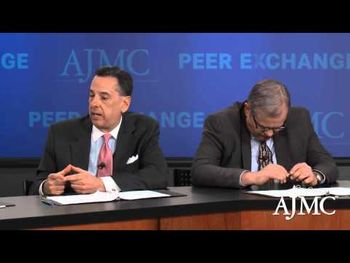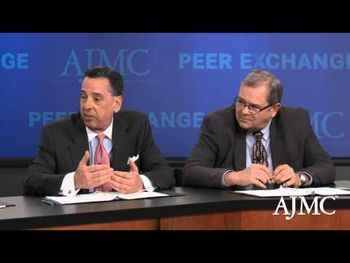
Clinical
Latest News
Latest Videos

More News

Less than 5% of individuals who received an opioid prescription are abusers, but they account for 32% of total opioid prescriptions and 40% of opioid prescription spending, according to a new report.

In this interview, Steven D. Pearson, MD, MSc, FRCP, founder and president of the Institute for Clinical and Economic Review, talks about the various value tools that have been developed, the need for understanding the budgetary impact of healthcare costs, and why stakeholders are interested in innovative models such as indication-based pricing.

Algenpantucel-L, an allogenic whole-cell immunotherapeutic vaccine being developed to destroy a patient’s pancreatic cancer cells, has failed to improve overall survival (OS).

Nanostring Technologies has announced that its Prosigna Breast Cancer Gene Signature Assay has received a positive coverage decision from the commercial health plan Aetna.

A new analysis of websites that provide information on pancreatic cancer, published in JAMA Surgery, has found that they overestimate the reading ability of the population and might even misguide them.

What we're reading: Arizona revives its Children's Health Insurance Program; new medical schools focus on creating a new type of physician; and Cigna believes its deal with Anthem won't close until 2017.

There may be an inexpensive way to reduce the risky use of pain medications by people at high risk of overdosing: using trained therapists in the emergency department to provide motivational interviews.

Discovery of a previously unknown heart muscle protein and how it affects mechanisms related to heart failure may lead to further treatments for cardiovascular disease.

A new study found the increase in the use of insulin reaped dual results: the pharmacy expenses were substantially increased but the number of hypoglycemia-related emergency department visits were reduced.


What we're reading, May 6, 2016: Both Democrats and Republicans are pushing back against the recent Medicare Part B proposal; medical overdose risk is high among people ages 45 to 64; and the Cayman Islands are releasing genetically modified mosquitoes to combat disease.

With reports documenting the shockingly rising use of e-cigarettes by middle and high school children, the announcement today that the FDA will extend its regulatory authority to include e-cigarettes is welcome news.

Scientists have discovered a new biomarker that could predict survival outcomes, and help establish the need for aggressive treatment, in patients with head and neck cancer.

What we're reading, May 5, 2016: obtaining life-ending medications under California's new law won't be easy come June 9; Arizona is now the only state to not participate in CHIP; struggling insurers propose big premiums increases on Obamacare plans.

A new study finds that more than one-third of heart failure (HF) patients do not receive recommended HF-specific medications within 30 days of diagnosis.

Patients and families can still have a limited understanding of palliative care, which may mean they have an open mind toward the suggestion, said Toby C. Campbell, MD, MSCI, associate professor of medicine, hematology-oncology at the University of Wisconsin School of Medicine and Public Health.

What we're reading, May 4, 2016: heart disease risk calculator has led to overtreatment; healthcare price transparency tool actually increased spending for those who used it; and Martin Shkreli may be facing additional charges.

A new commentary in the New England Journal of Medicine has cautioned clinicians to tone down the perceived benefits of earlier screening in colorectal cancer.

A new study published in the Journal of the National Cancer Institute has identified the cause of the high rates of bladder cancer cases diagnosed in the New England region of the United States: arsenic in drinking water from private wells.

Access to surgery in early-stage patients with non-small cell lung cancer is dependent upon the extent of racial segregation in the patient’s neighborhood, according to a new study in Cancer Epidemiology, Biomarkers & Prevention.

A study presented at the European Society for Radiotherapy and Oncology 35, ongoing in Turin, Italy, has shown that women younger than 45 years, diagnosed with early stage breast cancer, who chose breast conservation therapy followed by radiation, over mastectomy, had a significantly greater risk of local disease recurrence.

What we're reading, May 2, 2016: new discoveries about why people struggle to keep off weight; first Zika-related death in the US; and Medicare Advantage needs more competition.

Oral anticancer agents are being launched at significantly higher prices compared with a decade ago, which can prove a barrier to patient access, according to a new analysis published in JAMA Oncology.
















